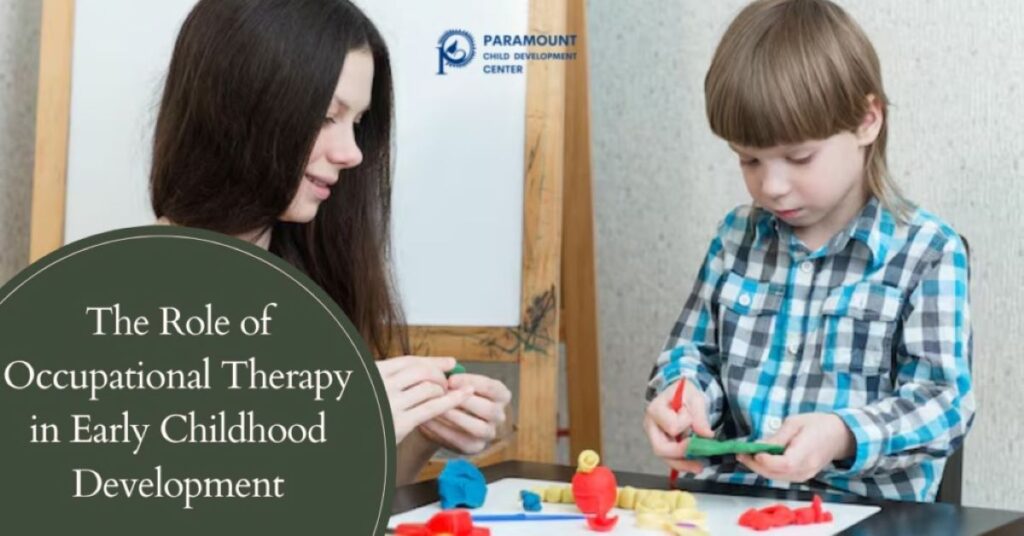Early childhood development shapes a child’s future success, making timely therapeutic support essential for optimal growth. Occupational therapy stands as a cornerstone intervention, empowering children to master daily activities and build crucial life skills.
Early support through occupational therapy creates a strong foundation for children’s:
- Physical development – fine and gross motor skills
- Cognitive growth – problem-solving abilities
- Social skills – peer interactions and communication
- Emotional regulation – managing feelings and responses
- Self-care abilities – feeding, dressing, and personal hygiene
Parents serve as vital partners in their child’s therapeutic journey. Their active involvement amplifies therapy outcomes by:
- Reinforcing learned skills at home
- Providing insights into the child’s needs and challenges
- Creating consistent supportive environments
- Participating in goal-setting and progress monitoring
This guide explores the transformative impact of early occupational therapy intervention, equipping parents with knowledge to support their child’s developmental journey effectively.
Understanding Pediatric Occupational Therapy
Pediatric occupational therapy for kids helps children develop essential life skills through specialised therapeutic interventions. This practice focuses on enabling children to participate fully in daily activities, from self-care routines to social interactions and learning experiences.
Key Developmental Areas:
- Fine motor skills for writing and self-care tasks
- Gross motor coordination for physical activities
- Visual-motor integration for reading and sports
- Sensory processing abilities
- Social interaction capabilities
- Self-regulation skills
Play-based therapy serves as a cornerstone of pediatric occupational therapy. Through structured play activities, children naturally develop crucial skills while staying engaged and motivated. These sessions might include:
- Building blocks for hand-eye coordination
- Sensory bins for tactile exploration
- Balance beams for vestibular processing
- Art projects for fine motor development
Sensory integration techniques address how children process and respond to sensory information. These approaches help children who might be over-or under-responsive to sensory input, supporting their participation in daily activities through carefully designed sensory experiences and environmental modifications.
Benefits of Early Intervention Occupational Therapy
Early intervention occupational therapy creates lasting positive impacts during critical developmental periods. Research shows children receiving therapy support between ages 0-3 experience significant improvements in:
- Motor Development: Gross motor coordination, fine motor skills, balance and body awareness
- Social-Emotional Growth: Self-regulation abilities, peer interaction skills, emotional expression, confidence building
- School Readiness: Pre-writing abilities, visual processing, following routines, classroom participation
Early therapeutic support helps identify potential developmental delays and provides targeted interventions before challenges become more complex. Children gain essential foundational skills through specialised play-based activities matched to their unique needs.
The brain’s natural plasticity during early childhood allows for optimal skill development when therapeutic strategies are implemented early. This neuroplasticity enables children to form new neural pathways and strengthen existing connections through engaging therapeutic activities.
Parents report seeing marked improvements in their child’s independence, social connections and learning capabilities after consistent early intervention occupational therapy sessions.
Conditions Treated with Occupational Therapy
Occupational therapy addresses a wide range of developmental conditions through specialised interventions:
1. Autism Spectrum Disorder (ASD)
- Structured routines and visual schedules
- Social skills development through guided play
- Sensory-friendly environments and adaptations
- Fine motor skill enhancement for daily tasks
2. Attention Deficit Hyperactivity Disorder (ADHD)
- Organisation and time management strategies
- Focus-enhancing activities
- Self-regulation techniques
- Task breakdown and completion skills
3. Sensory Processing Disorders
- Custom sensory diets
- Environmental modifications
- Proprioceptive activities
- Tactile desensitisation exercises
4. Behavioural Challenges
- Positive reinforcement strategies
- Anxiety management techniques
- Self-advocacy skills development
- Coping mechanisms for transitions
Each child receives individualised treatment plans based on their specific needs and challenges. Therapeutic approaches integrate play-based activities with evidence-based interventions to support developmental progress. Regular assessments track improvements and adjust strategies to maintain optimal outcomes.
Therapeutic Strategies in Paediatric Occupational Therapy
Sensory Integration Therapy
Sensory integration therapy serves as a cornerstone approach in paediatric occupational therapy. This evidence-based practice helps children process and respond to sensory information through structured activities such as:
- Deep pressure exercises
- Vestibular activities using swings
- Proprioceptive input through climbing walls
- Tactile experiences with various textures
Neurodevelopmental Techniques
In addition to sensory integration therapy, neurodevelopmental techniques are also instrumental in paediatric rehabilitation. These techniques focus on improving the child’s ability to control their movements and enhance their overall functional abilities.
Adaptive Equipment
Adaptive equipment plays a vital role in creating engaging therapy sessions. These specialised tools support children’s participation and skill development:
- Weighted items: Vests, blankets, and lap pads for calming effects
- Seating solutions: Therapy balls, cushions, and modified chairs
- Writing aids: Pencil grips, slant boards, and adapted scissors
- Sensory tools: Fidget toys, chew necklaces, and noise-cancelling headphones

Research-Backed Practices
Research-backed practices for emotional and social development include:
- Structured play scenarios for peer interaction
- Social stories and role-playing activities
- Self-regulation exercises using visual schedules
- Mindfulness techniques adapted for children
These therapeutic strategies create a comprehensive framework for addressing each child’s unique developmental needs while maintaining engagement through purposeful play-based activities.
Involvement of Parents in the Therapy Process
Parents play a vital role as active participants in their child’s occupational therapy journey. A collaborative partnership between therapists and parents creates optimal conditions for a child’s development and progress.
Key Areas of Parental Involvement:
- Daily Routine Integration: Incorporating therapeutic activities into everyday tasks, adapting home environments to support skill development, and maintaining consistency in therapeutic approaches.
- Skill Development at Home: Learning specific techniques to assist with daily activities, implementing sensory strategies during challenging situations, and practising therapeutic exercises between sessions.
- Educational Empowerment: Understanding developmental milestones and expectations, recognising signs of progress or challenges, and learning to advocate for their child’s needs.
Parents can create supportive home environments by:
- Setting up dedicated spaces for therapeutic activities
- Removing environmental barriers to success
- Establishing predictable routines that promote learning
Regular communication with occupational therapists helps parents understand their child’s unique needs and progress. This knowledge enables them to make informed decisions about their child’s care and actively contribute to therapeutic goals.
Role of Occupational Therapy in Early Intervention Services
Early intervention services, such as those outlined by the Pennsylvania Department of Education, create a comprehensive support system through integrated therapy approaches. Occupational therapists work hand-in-hand with speech pathologists and physiotherapists to address multiple developmental areas simultaneously. This collaborative approach enables:
Coordinated Care Planning
- Shared therapeutic goals across disciplines
- Consistent intervention strategies
- Regular team meetings to track progress
Multi-Disciplinary Benefits
- Speech therapy enhances communication during OT activities
- Physical therapy supports gross motor skills in daily tasks
- Sensory integration techniques complement all therapies
The transition from early intervention to school-based programs requires careful planning. Parents can expect:
School Readiness Assessment
- Evaluation of current skills and support needs
- Development of school-specific goals
- Creation of individualised support plans
The assessment process, which is crucial for school readiness, involves evaluating the child’s current skills and determining their support needs.
Transition Support
- Collaboration with school staff
- Environmental modifications recommendations
- Ongoing therapy adjustments to match school demands
These integrated services, including occupational therapy, establish strong foundations for children’s development across all key areas of learning and growth.
Impact of Pediatric Occupational Therapy on Child Development
Pediatric occupational therapy creates lasting positive changes in children’s developmental trajectories through targeted interventions and skill-building activities.
Independence Skills Development
Pediatric occupational therapy helps children develop essential independence skills, including:
- Self-care routines like dressing, feeding, and personal hygiene
- Time management and organisation skills
- Decision-making abilities in age-appropriate contexts
- Daily living tasks suited to developmental stage
These skills are crucial as outlined in the NC Foundations for Early Learning and Development, which emphasizes the importance of developing foundational skills during early childhood.
Building Resilience and Coping Strategies
Occupational therapy also focuses on building resilience and teaching coping strategies to children. This includes:
- Emotional regulation techniques
- Stress management tools
- Problem-solving approaches
- Adaptability in different environments
- Self-advocacy skills
Academic Achievement Support
In addition to independence skills and resilience building, occupational therapy supports children’s academic achievement through:
- Fine motor skills development for writing and drawing
- Visual-spatial processing enhancement for reading and mathematics
- Attention span and focus improvement techniques
- Classroom participation strategies
- Homework routine establishment
Research demonstrates that children receiving occupational therapy show marked improvements in:
- Social interaction capabilities
- Physical coordination
- Cognitive functioning
- Emotional regulation
- Academic performance
These developmental gains extend beyond therapy sessions, empowering children to participate fully in home, school, and community activities. The skills acquired through occupational therapy create a strong foundation for lifelong learning and independence.
Occupational therapists track progress through standardised assessments and real-world observations, adjusting intervention strategies to match each child’s evolving needs and capabilities.
Moreover, the insights gained from resources like the National Academies report can further enhance our understanding of the impact of such therapies on child development, providing valuable guidelines for both practitioners and parents alike.

Conclusion
Pediatric occupational therapy is a powerful tool for helping children develop. Early intervention has a lasting positive impact on a child’s life, giving them the skills they need to be independent and grow.
The collaboration between occupational therapists, parents, and children creates a strong foundation for:
- Developmental Progress: Targeted interventions unlock each child’s unique potential
- Life Skills: Practical strategies enhance daily living abilities
- Social Connections: Strengthened relationships with family and peers
- Academic Readiness: Enhanced learning capabilities for educational success
Parents who embrace early occupational therapy support give their children invaluable tools for navigating life’s challenges. The decision to seek professional guidance opens doors to transformative possibilities in a child’s development journey.
Every child deserves the opportunity to thrive. Through dedicated occupational therapy support, children can build the confidence, skills, and resilience needed to embrace their full potential and create meaningful connections in their world.
Related : Speech Therapy Exercises for Toddlers: What Works Best

